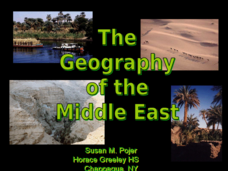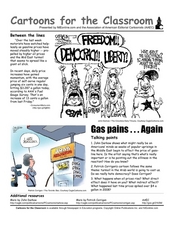Curated OER
Early African Kingdoms & Empires
Give your class a thorough view of African history with this series of photographs, maps, and engaging questions. Coupled with a lecture about human migration and religious and European influences on the continent, this presentation will...
Curated OER
The Geography of the Middle East
Topographic, political, and satellite maps establish the world of the Middle East for your class- a land about which they have heard quite a lot, but might not really understand. This presentation would be a good introduction into a unit...
Curated OER
Islam: Submission to the Will of Allah
Presenting both a thorough scope of the foundations of Islam, as well as a question about Islam in America after 9/11, this slideshow provides a comprehensive outline of the background and five pillars of Islam. Viewers will walk away...
Curated OER
World Oil Reserves: Assignment
Understanding and analyzing data is a critical skill. Included here are three worksheets a list of countries with the largest oil reserves, a graph of the same, and an assignment. The class uses their data to create a bar chart then...
Curated OER
Cartoons in the Classroom: Gas Pains Again
The price of gas has increased around the country, and many political cartoons, such as this one, have used humor to get people thinking about it. With the help of three very good critical thinking prompts, learners will analyze a...
Curated OER
The U.S. War in Iraq Officially Ends
Examine issues and events surrounding US withdrawal of troops from the Iraq War. After reading this New York Times article learners respond to each of the nine who, what, when, where, and why questions.
Curated OER
The 'Question of Palestine'
New York Times covers hot topics and current events, now you may use those articles to help young people become more aware. Kids read an article regarding the Israeli-Palestinian agreement and the prospect of Palestine joining the UN....
Curated OER
Ojala y Quizas: El subjuntivo
The Spanish expressions meaning "hopefully" and "maybe" are always followed by the subjunctive. The top half of this activity provides an explanation and clear examples, while the bottom half provides a short practice section. For the...
Curated OER
Less vs. Fewer
When should you use less, and when should you use fewer? Straighten out this dilemma with a helpful resource about using less vs. fewer based on sentence context clues. After reading detailed instructions and examples, young learners...
Curated OER
Connectives
Using connectives and conjunctions is an easy way to vary sentence structure. Third graders review the given connectives, then use them to combine two simple sentences. The second section allows learners to use more words and phrases as...
Curated OER
Anti-Semitism Workshop
Originating from the Yad Vashem Holocaust Memorial Museum in Jerusalem, here is a resource to support your world historians in their study of World War II, the Holocaust, your cultural scholars learning about anti-semitism, or your...
Curated OER
The Beginner's Guide to Teaching ESL Abroad
The expected, unexpected, retrospective, and respected perspective of teaching overseas.
Google
Google Translate
Not sure how to translate a word, phrase, or paragraph? No worries. Simply paste in, type, or dictate your text, select the initial and desired language, and up pops your translation. Better yet, the app will read the text to you in most...
Curated OER
Caliphates Graphic Organizer
As your young historians learn about the Umayyad and early Abbasid Caliphate through reading secondary sources, have them use this simple printable to organize their notes on the topic and provide points of focus for their reading.
American Documentary
Religion in Culture & Politics: Women’s empowerment in Syria
What defines a woman as empowered, and how does this definition compare to the ideas and actions of a group of Muslim women in Syria? After watching a series of video clips from a documentary film about a school for girls in Damascus,...
Penn Museum
Ancient History Math Mystery
Through several organized and attractive worksheets, your learners will make a deduction about tally marks and hieroglyphics to determine what they represent in the ancient numeral system. This is a well-designed, interdisciplinary...
Education Outside
Papermaking
Imagine recycling food scraps and using them to make paper. The directions are all here in a seven-page packet that details several paper-making strategies.
Visa
Credit Cards
Choosing your first credit card can often be an intimidating and confusing experience for young adults. Give your pupils the foundational knowledge they need for tackling this process head-on, including learning to distinguish different...
Practical Money Skills
Making Decisions
A set of quizzes and assessments would make a great companion to your lesson plan on making decisions and opportunity risks. Learners watch a PowerPoint before answering multiple choice questions about interest rates, saving money, and...
Hampton-Brown
From "First Crossing"
Young scholars look closely at four tales taken from the collection of short stories, First Crossing edited by Donald R. Galloby. While examining the life of four teenagers and the lives they lead as U.S. immigrants, your enthusiastic...
Code.org
Number Systems
Generating a system of shapes. Groups work together to create a number system using three different shapes as symbols. The groups should come up with the rules that generate all the possible permutations of the three shapes.
Peace Corps
Introducing Culture
Growing up within a culture leaves a lot of ideas and values unspoken. Take a closer look at the cultures in which your learners live with a discussion activity that addresses cultural identity and traits of those living within the...
Balanced Assessment
Star from Square
Quilting is not only beautiful and unique—it is a mathematical art. Show your classes how to design a quilting block while practicing area and circumference of circles. Scholars create a star from a square and then find the circumference...
Balanced Assessment
Sloppy Student I
"Does this work every time?" We've all heard it. Now learners get to explore methods to answer that question themselves. Pupils analyze a mistake that has been made with creating a formula for multiplying binomials. They then create...
Other popular searches
- Arabic Poetry
- Arabic Calligraphy
- Arabic Influence
- Multicultural Music Arabic
- Arabic Numbers
- Arabic Language
- Arabic Numerals
- Arabic Architecture
- Arabic Influence in Spain
- Arabic Foods
- Arabic Poetry for Teachers
- Arabic Poetry for Students

























